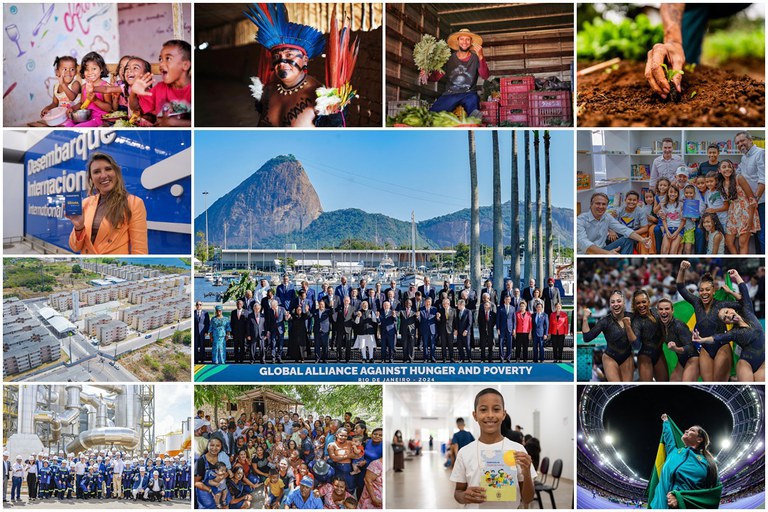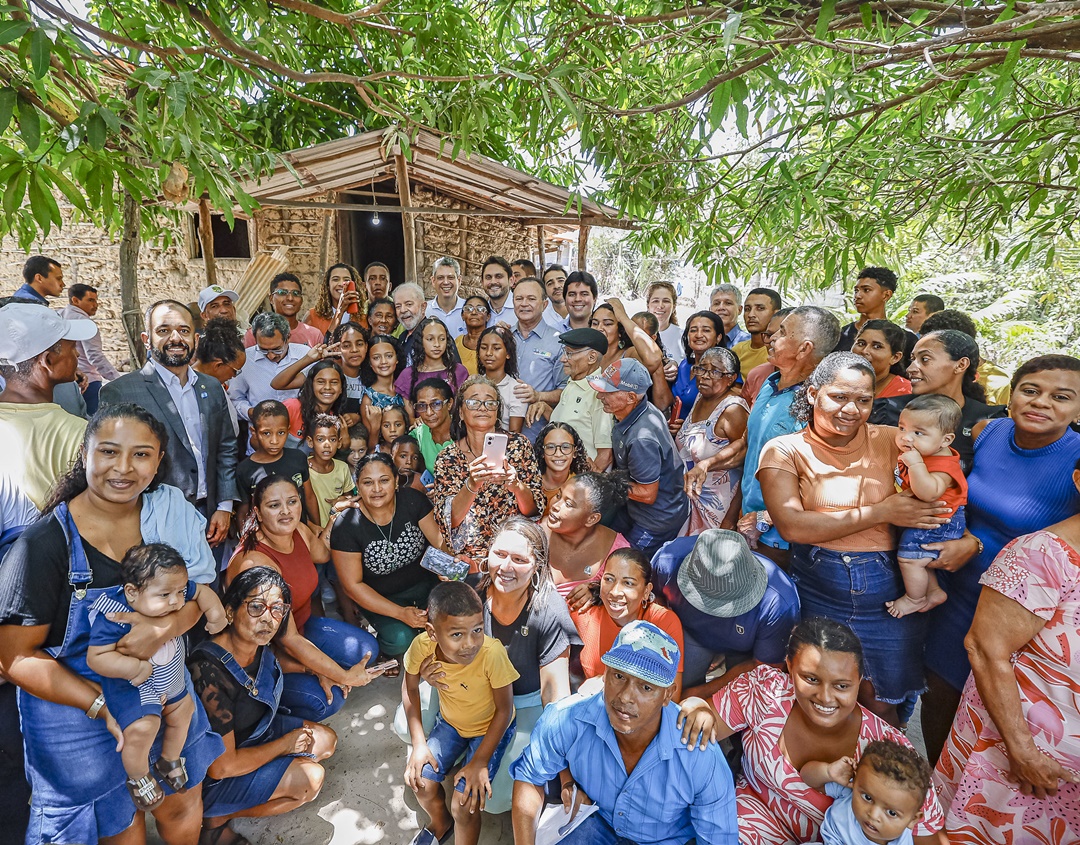Notícias
MANAGEMENT
2024, a year that consolidated economic, social, geopolitical progress

A mosaic depicting the impact of federal policies throughout the country. - Credit: Ricardo Stuckert / PR, COB, CPB, Ministry of Cities, Ministry of Tourism, Getty Images, Estevam Costa / PR
The year 2024 comes to an end with Brazil recording the lowest unemployment rate (6.1%) of the PNAD Contínua historical series since 2012. It ends with 103.9 million occupied individuals, a new record, and 3.7 million formal jobs created since January 2023. The nation had grown 3.2% last year and is expected to close the year 2024 with a 3.5% expansion of its Gross Domestic Product (GDP). The policy for increasing the minimum wage made it possible for the new amount for 2025, announced this Monday, December 30, to reach BRL 1,518 (approximately USD 245.38), an increase of BRL 106 (approximately USD 17.13) compared to 2024.
2024 was a generous year. We traveled across Brazil and saw first-hand the gratitude of those who were impacted by our administration’s public policies. Each encounter reaffirmed the importance of keeping up the work, of taking care of the people. In 2025, we will do even more!"
Luiz Inácio Lula da Silva, Brazil’s President of the Republic
The numbers that show economic growth are accompanied by the resuming of social indicators. Federal policies such as the Bolsa Família, the National Food Acquisition Program (Programa de Aquisição de Alimentos), and the National School Meals Program (Programa Nacional de Alimentação Escolar) jointly helped to ensure that 24.4 million individuals were lifted from the Hunger Map since 2023. The Minha Casa, Minha Vida housing program hired 1.2 million new homes and ensured the resuming of 44,000 construction works that had been paralyzed. In Education, one million new posts were created in the Full Time program and 4 million students received the Pé-de-Meia scholarship savings in 2024. In Health, the Mais Médicos (“More Doctors”) program currently congregates over 26,900 professionals throughout the country, the Farmácia Popular (“People’s Pharmacy”) program benefited over 24 million with free medications, vaccination came back to be a reference and Brazil exited the list of the 20 countries with the highest numbers of unvaccinated children globally.
» Check out the Federal Government’s investments in 2024 in the 27 states
» Check out the Federal Government’s investments in 2024 for municipalities and citizens
» Learn about the ComunicaBR, the Federal Government’s data platform
"2024 was a generous year. We traveled across Brazil and saw first-hand the gratitude of those who were impacted by our administration’s public policies. Each encounter reaffirmed the importance of keeping up the work, of taking care of the people. In 2025, we will do even more," stated President Luiz Inácio Lula da Silva in a social media post on December 31st.
AGRO — In the fields, the country recorded the largest historical harvest plan in 2024. A total of BRL 618 billion in rural credit has been destined for funding, commercialization, investment, and industrialization since 2023. In family farming, another record: BRL 110 billion in credit for investments since 2023. In the international scenario, 300 new markets have been opened to national agricultural and livestock products in 62 countries since the beginning of 2023, with highlights to the opening of bovine meat exports to Mexico and the Dominican Republic and the inclusion of new products to Singapore, Dominican Republic, Japan, Peru, El Salvador, China, Chile, and Israel, as well as the expansion of new meatpacking plants authorized for export to China.

ENVIRONMENT — In the Environmental area, the country recorded the highest reduction of deforestation levels in the Amazon in 15 years, a 25% drop in deforestation in the Cerrado, the first recorded in the biome in five years, and a 77% drop in the Pantanal between August and November 2024 compared to the same period in 2023. The Fuel of the Future Law (Lei do Combustível do Futuro) signed by President Lula foresees investments of BRL 260 billion for the country and projects to avoid the emission of over 705 million tons of CO2 by 2037.

INDUSTRY — In the process of resuming Brazilian industry sponsored by the Federal Government, a total of BRL 2.2 trillion in private investments have been announced for sectors such as construction, renewable energies, agriculture, automotive, paper and celulose (pulp), information and communication technology, steel, and health. Among the federal goals for the new stage are the expansion of participation of biofuels and electricity in the energy matrix for transportation and a 30% increase in the technological and sustainable use of biodiversity by 2033.

QUILOMBOLAS — Throughout the year, a total of 31 decrees provided land titles that are key to the autonomy and strengthening of quilombola communities. Through the publication of these titles, the Federal Government consolidated a strategy that strengthens policies that protect the territorial rights of the quilombolas. These acts go beyond mere land regularization: they represent the resumption of the commitment to social justice, and equity, and the recognition of these populations’ historical demands.

INDIGENOUS LAND — By early December, the Federal Government had delivered the ratification of 13 Indigenous Lands. The ratified areas are part of a government proposal designed during the transition period which foresaw a total of 14 territories. The ratification package was based on analyses that indicated the most agile processes, considering the historical complexity of demarcations.

YANOMAMI — The Federal Government ended 2024 with significant advances in combating illegal mining and the protection of the Yanomami Indigenous Land, in the state of Roraima. Over 3,488 operations were conducted in nine months, consolidating the removal of invaders, the destruction of criminal logistic equipment, and assistance to the communities. The overview reveals a 96.3% reduction in the establishment of new mining sites compared to 2022, when illegal mining in the region peaked. Throughout the year, federal forces seized or confiscated over 33 kg of illegally extracted gold and 226 kg of mercury. Strategic actions disrupted mining operations by destroying over 80,000 liters of diesel fuel and closing fueling stations. More than 50 illegal landing strips were dismantled, and a total of 1,063 engines, over 120 tons of cassiterite, and 26 aircraft were rendered unusable. These efforts resulted in a loss of BRL 267 million for illegal mining operations.

- The artistic gymnastics team shined at the Olympic Games, and athletics led Brazil’s best performance in Paralympic Games history. Images: Miriam Jeske / COB, and Wander Roberto / CPB
SPORTS — The year 2024 saw history being made in Brazilian sports, with expressive results in the Olympic Games and the best campaign in the country’s history in the Paralympic Games. Similarly, it was a significant period for the Bolsa Atleta, the Federal Government’s program that provides sponsorship to individual athletes. Celebrating its 20 years of existance, Bolsa Atleta saw its amounts adjusted for the first time in 14 years and demonstrated the extent of its reach by being part of the journey of 100% of the Brazilian medalists who stood on the podium in Paris. In 2024, the program had a record participation of 9,075 beneficiaries through an investment of BRL 155 million. In another front, the Sports Incentive Law (Lei de Incentivo ao Esporte) saw the record presentation of 6,664 projects, with over one million of people receiving the incentives by early December. Investments in sports infrastructure were another highlight. The New Growth Acceleration Program (Novo PAC) recorded the beginning of the construction of 400 community sports centers throughout the country. Located in vulnerable areas, these spaces reinforce access to sports and leisure and contribute to reducing violence, strengthening community bonds, and reducing inequalities.

TOURISM — Brazil broke its record of international tourists visiting the country in 2024. Over 6.621 million travelers chose Brazilian destinations for leisure or business trips. Announced on December 30, this number exceeds the historical mark from 2018 when 6,6 million foreigners visited, consolidating a new record since the beginning of the historical series in 1970. With this result, Brazil gets closer to the goals established by the Tourism National Plan (Plano Nacional de Turismo), which aims for 8.1 million international tourists in the next three years. International tourist spending also reached a new record between January and November 2024. Data from the Banco Central show that the total reached USD 6.62 billion, the largest sum recorded in the first 11 months of the year since 1995. The number represents a 5.3% increase to that recorded in the same period in 2023 (USD 6.29 billion) and exceeds the amount recorded in the same period in 2014 (USD 6.30 billion), when the country hosted the Soccer World Cup.

FOREIGN AFFAIRS — In 2024, President Lula visited 13 countries and received nine heads of state in Brasilia to strengthen the country’s image and protagonist in the international scenario. In Rio de Janeiro, Brazil hosted leaders of the main world nations at the G20 Summit and officially launched the Global Alliance against Hunger and Poverty, an initiative born with 148 adhesions among 82 countries, the African Union, the European Union, 24 international organizations, nine financial institutions, and 31 philanthropic and non-governmental organizations. The Mercosur Summit at the end of the year saw the conclusion of the bloc’s agreement with the European Union, a diplomatic victory after over two decades of negotiations. In the context of humanitarian efforts, Operation Cedar Roots (Operação Raízes do Cedro) rescued 2,663 passangers and 34 pets in 13 repatriation flights that left the conflict zone in Lebanon to Brazil. In 2025, Brazil will remain in the spotlight. The country will host the BRICS Summit and the United Nations Climate Conference (COP30) to be held in Belém do Pará, marking the first time the event will take place in an Amazon city.

- President Lula in one of his many visits to Rio Grande do Sul during the climate crisis period in the state. Image: Ricardo Stuckert / PR
RIO GRANDE DO SUL — Rescue, salvaging, shelter, food security, healthcare services, logistics for sending supplies and donations, as well as emergency and administrative measures to assist individuals, ensure job maintenance, resume agricultural production, and rebuild infrastructure and the support network. The Federal Government was swiftly, extensively, and collaboratively involved with the state and municipalities to address the climate emergency that struck Rio Grande do Sul in May.. Total resources destined by the Federal Government exceeded the BRL 100 billion in efforts that engaged dozens of thousands of professionals acting both at the frontline of rescue operations and humanitarian help for the recovery of support structures in the areas of health, education, social assistance, infrastructure, housing, telecommunications, connectivity, environment, agriculture and livestock, and water and energy supply.